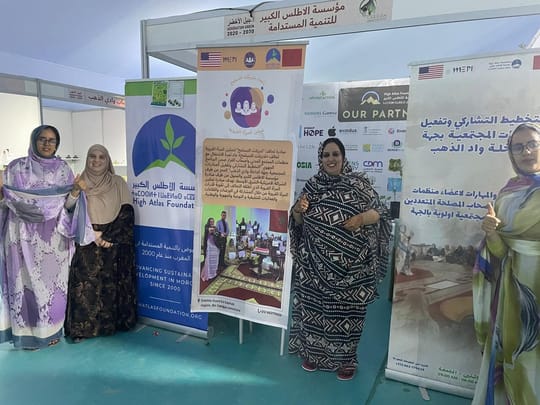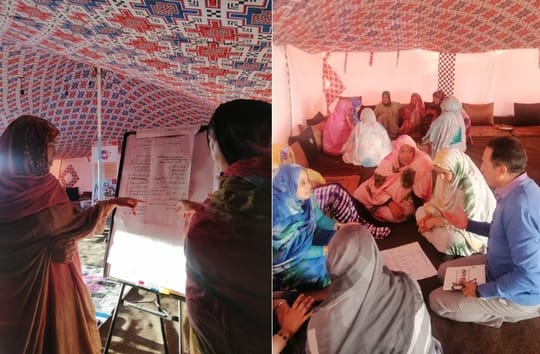From Marginalization to Empowerment: Rural Women Drive Local Decision-Making in Bir Gandus Municipality

In the rural Bir Gandus municipality of the Dakhla-Oued Ed Dahab region, the southernmost part of Morocco, a radical transformation has happened. Through a participatory process engaging community stakeholders and training on capacity building, conflict resolution, collective action, and smart planning, women from the local community have transformed their position in society to emerge as formidable leaders.
Five women’s cooperatives united to create the Tidarguit Tasamoh Alliance, setting these women leaders on the path of advocacy and change through women’s solidarity in their area. This transformation was initiated through the “Community Initiatives in Dakhla Oued Ed Dahab Region” program implemented by the High Atlas Foundation (HAF) and funded by the Middle East Partnership Initiative.
Bir Gandus may be relatively unknown by most Moroccans and international audiences, being located four hours drive south of Dakhla near the Mauritanian border. The women's leadership journey began in October 2022 where at the first participatory meeting, women expressed frustration at the exclusion of women in community decision-making.
To overcome historical and cultural barriers to women’s leadership, these women advocated smartly to demonstrate the value added by women’s enhanced participation and built trust among community members to open the decision making space. They met with government authorities and shared a plan to manage the place for the cooperative’s production of couscous and for shared community initiatives. They were given support to move ahead.
Next the Alliance implemented key activities in its strategic plan. They conducted a study tour of successful advocacy-oriented civil society organizations (CSOs) and cooperatives in Boujdour, they researched the certification process with the government’s food safety department (ONSAA) for their cooperative production, and they traveled to Guelmim to participate in an international trade fair featuring local products.
Impressively, the activism of the Bir Gandus women went beyond the topics related to the development of their cooperative. They used their new skills to speak up at community meetings concerning stray dogs and the danger to children, access to sanitation and water resources, frequent electrical cuts, and the lack of specialized physicians.
In Morocco, CSOs like the Tidarguit Tasamoh Alliance play a key role in the advancement of participatory governance. CSOs in Morocco are registered entities that provide members with the right to advocate, and ask for meetings and resources. Through their CSO, members are able to respond to tenders and easily petition the government. The Alliance's journey through the program, from seed to fruit, exemplified the value of collective action and the effectiveness of focused support in engaging and advancing local participatory government.

Tidarguit Tasamoh training in management and strategy planning-Credit by HAF